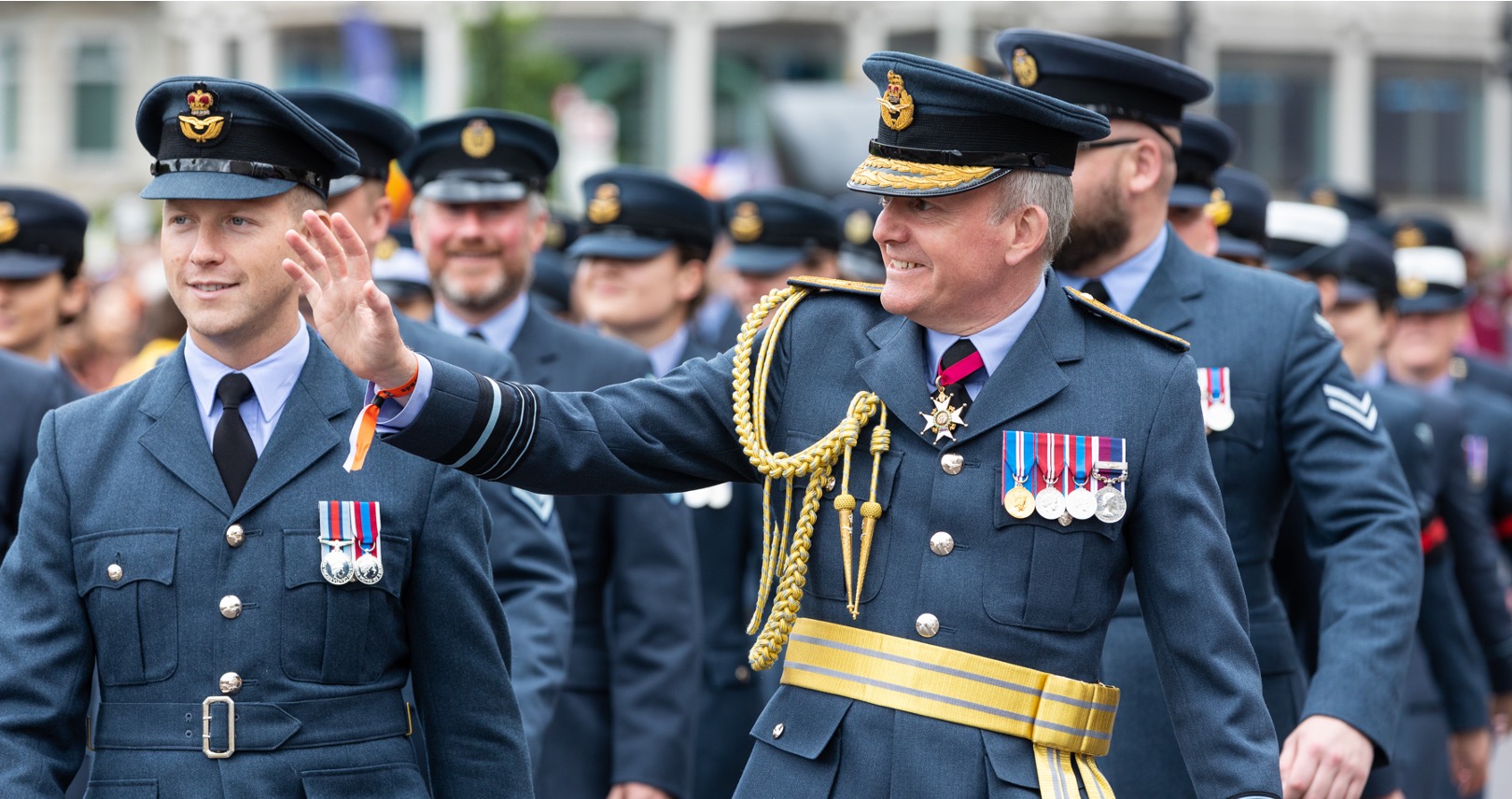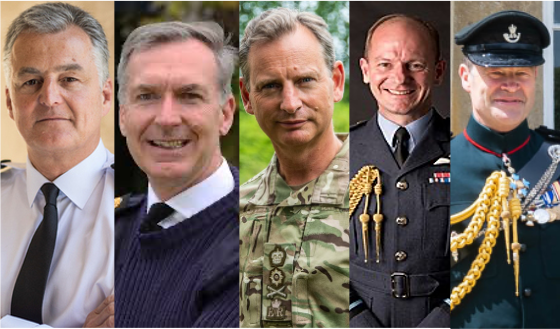At the start of the year, as Prime Minister Boris Johnson prepared to replace General Sir Nick Carter as the UK’s Chief of the Defence Staff, onUKDefence reviewed the runners and riders in the race to be his replacement. However, on 5th March, Defence Secretary Ben Wallace (Conservative MP for Wyre and Preston North) announced that Carter would be extended in post until the end of November. Six months on, and the race is again nearing the home straight.
Runners and Riders
Back in January, we assessed the runners and riders to be Vice Chief of the Defence Staff, Admiral Sir Tim Fraser, the First Sea Lord, Admiral Tony Radakin, Chief of the General Staff, General Sir Mark Carleton-Smith, Chief of the Air Staff, Air Chief Marshal Sir Mike Wigston, and Commander Strategic Command, General Sir Patrick Sanders. However, onUKDefence has since learned that Admiral Fraser’s preference is to retire when his tenure as Vice Chief is up next April.
Moreover, in a surprising move recently reported by The Times, the Prime Minister has apparently asked for a broader pool of candidates to select from. This would mean considering for the first time a three-star officer who, if successful, would effectively leapfrog all the service chiefs into the top job. The most likely candidate identified by The Times is Vice Admiral Ben Key, who is currently Chief of Joint Operations, the senior officer in the UK’s Permanent Joint Headquarters.
Following the success of Operation Pitting, the non-combatant evacuation operation of Afghanistan, and the solid management of the UK Carrier Strike Group’s ongoing first operational deployment, Key’s stock is high and he should be considered a serious contender. In his previous appointment as the Royal Navy’s Fleet Commander, Key was the favourite to become First Sea Lord back in 2019. There would be more than a little irony if he was now selected for the top job in Defence ahead of Admiral Radakin, who overtook him to take the Royal Navy’s top job just two years ago.
Jockeying for Position
DSEI 21, a major arms fair being held in London this week, has provided several of the candidates the opportunity to force themselves back into the spotlight. An extensive defence engagement programme has included keynote addresses by General Sanders, General Carleton-Smith and Air Chief Marshal Wigston.
General Sanders opened DSEI on Tuesday with a speech that sought to bring to life multi-domain integration, the theme for DSEI 21. He outlined the military’s significant challenge to make sense of, exploit and manipulate data, and confirmed the true source of battlefield advantage would come from an ability to sense, understand and orchestrate across all five operational domains (maritime, land, air, cyber and space) at a tempo faster than the enemy. He also highlighted the integration problems Defence still faces, being largely a tri-service organisation, and the skills shortfalls that exist across both the military and civil service workforce. To emphasise the different talents that will be needed in the future, he quipped that he had more need of Q than 007.
As you would expect, General Carleton-Smith’s speech was an army-oriented view of the world. He too recognised the substantial change that is facing the military, suggesting that the British Army’s transformation from mechanisation to digitisation would be even more significant than its 1930/1940s move to mechanisation, when it ‘did away with hay-nets and moved to fuel cans’. He also argued that the economics of warfare are changing with a real premium on critical mass, which he defined as ‘capabilities that are both credible and relevant, that are networked and deployable’.
Similarly, Air Chief Marshal Wigston focused on the once-in-a-generation opportunity that the recent increase in Defence spending had given ‘to build an air and space force fit for the future’. He called out the RAF as the 20th century’s original tech start-up and reiterated the unique relationship that already exists between his service and the aerospace and tech industries. The meat of the address concentrated on the RAF’s ambitious, and already in-flight, projects for the future – Tempest, the Future Combat Air System, Project Mosquito, the autonomous combat aircraft, and the SkyGuardian Protector prototype recently unveiled at RAF Waddington. He also cemented the RAF’s position as the lead service on the development and operation of space-related capabilities.
Admiral Radakin did not attend DSEI this week. In his place, the maritime keynote address was given by his deputy, Vice Admiral Nicholas Hine. That said, the First Sea Lord’s twitter feed has been full of details about how the Royal Navy has been improving availability across its surface and sub-surface fleets. This is in direct response to the Secretary of State’s challenge, back in October 2019, to make increasing warship availability a priority.
Conclusion
It is no surprise that the contenders in the race to replace General Carter are doing all they can to increase their profile and position themselves as the best person to lead Defence through what will surely be a turbulent next few years. With a current portfolio that includes most of the high-profile capabilities underpinning Defence’s multi-domain integration concept, General Sanders is probably in the strongest position to talk that talk. However, onUKDefence still believes that the next Chief of the Defence Staff will be an admiral. It is more than 20 years since the Navy got the top job and the maritime domain remains a key enabler in Boris Johnson’s Global Britain strategy. The question is: will the race be won by the front-running favourite, or will he be pipped to the post by a late-challenging outsider?







1 comments On The race to be next Chief of the Defence Staff is reaching the home straight
Dates of birth of candidates offer a further insight:
Carelton-Smith – CGS (Feb 64) is probably too old to become CDS.
Radakin – CNS (Nov 65) is exactly the right age and suits the Prime Minister’s global view of the UK’s power projection.
Wigston – CAS (Feb 68) is too young so he could replace Fraser as VCDS – because you cannot have a same service CDS & VCDS – before replacing Radakin as CDS in 2024/5.
Sanders – Commander Strategic Command (Apr 66) is more likely to replace Carelton-Smith as CGS.
Key – Chief of Joint Ops (Nov 65). If Radakin becomes CDS, then Key gets CNS.